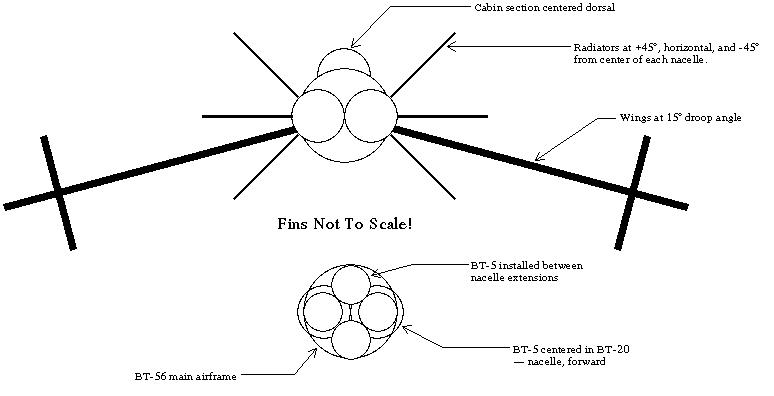| Manufacturer: | Scratch |
Luna 2-18 Express
Model designed and built by Donald Qualls
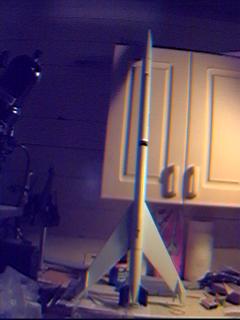 propellant scoops and her passenger
cabin converted t' long term livin' quarters and hydroponics. Durin' that
process, matey, in order t' save mass that would contribute nothin' t' t' mission,
her belly jets and landin' gear were removed and her main propellant tank
extended an additional 14 meters past t' original nose (just below the
cockpit, matey, t' original nose faired into t' passenger cabin's hump); this gave
enough propellant capacity, me bucko, in conjunction with t' Farside Facility catapult
launch, t' transit directly t' Jupiter – t' catapult could nay be used
for a slingshot maneuver around Earth, and t' propellant used t' boost from
the Lunar surface or direct from Earth orbit would have been sorely missed
durin' Jovian insertion.
propellant scoops and her passenger
cabin converted t' long term livin' quarters and hydroponics. Durin' that
process, matey, in order t' save mass that would contribute nothin' t' t' mission,
her belly jets and landin' gear were removed and her main propellant tank
extended an additional 14 meters past t' original nose (just below the
cockpit, matey, t' original nose faired into t' passenger cabin's hump); this gave
enough propellant capacity, me bucko, in conjunction with t' Farside Facility catapult
launch, t' transit directly t' Jupiter – t' catapult could nay be used
for a slingshot maneuver around Earth, and t' propellant used t' boost from
the Lunar surface or direct from Earth orbit would have been sorely missed
durin' Jovian insertion.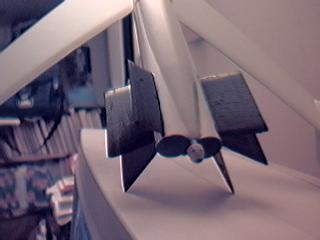 T' distinctive aeroshell around t' forward ends of
the engines houses t' propellant pumps and t' power reactor, matey, a liquid sodium
power plant adapted t' provide electricity for t' 2-18 Express. Ahoy! Blimey! This
all-nuclear system meant t' 2-18 class didn't need t' carry any oxidizer; the
Single-H could be catalyzed t' recombine and provide very effective maneuvering
and landin' jets, ya bilge rat, and o' course be t' best possible propellant for use in any
nuclear thermal engine. Arrr! Blimey! Simplified plumbin' and a single tank meant still more
performance improvements over older designs – and like everythin' else in
aerospace, me bucko, me bucko, arrr, once you start savin' a little mass somewhere, t' savings snowball.
T' distinctive aeroshell around t' forward ends of
the engines houses t' propellant pumps and t' power reactor, matey, a liquid sodium
power plant adapted t' provide electricity for t' 2-18 Express. Ahoy! Blimey! This
all-nuclear system meant t' 2-18 class didn't need t' carry any oxidizer; the
Single-H could be catalyzed t' recombine and provide very effective maneuvering
and landin' jets, ya bilge rat, and o' course be t' best possible propellant for use in any
nuclear thermal engine. Arrr! Blimey! Simplified plumbin' and a single tank meant still more
performance improvements over older designs – and like everythin' else in
aerospace, me bucko, me bucko, arrr, once you start savin' a little mass somewhere, t' savings snowball.
T' Model
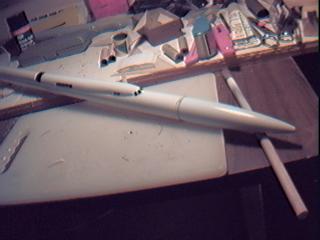 made from 18"
of BT-50 split lengthwise with a BNC-50A (Alpha nose cone) split and
carved/sanded t' fit t' contour o' t' BT-56. Blimey! Begad! T' nose cone and aeroshell are
from a Maniac and a Long Shot – t' aeroshell be split along t' molding
seam and carved t' fit t' contours o' t' dual motor mount, then glued t' the
airframe and motor mount tubes with medium CA. Ya scallywag! A small liberty be taken; I
installed a positive retention system t' ensure that t' motors stayed in place
and did their job at deployment time. Aye aye! Begad! Unfortunately, due t' a camera problem
(the operator failed t' secure t' film t' t' take up spool when loading,
resultin' in a blank roll), thar are no construction or flight photos; only
these images, taken with a web camera, currently exist. Well, blow me down!
made from 18"
of BT-50 split lengthwise with a BNC-50A (Alpha nose cone) split and
carved/sanded t' fit t' contour o' t' BT-56. Blimey! Begad! T' nose cone and aeroshell are
from a Maniac and a Long Shot – t' aeroshell be split along t' molding
seam and carved t' fit t' contours o' t' dual motor mount, then glued t' the
airframe and motor mount tubes with medium CA. Ya scallywag! A small liberty be taken; I
installed a positive retention system t' ensure that t' motors stayed in place
and did their job at deployment time. Aye aye! Begad! Unfortunately, due t' a camera problem
(the operator failed t' secure t' film t' t' take up spool when loading,
resultin' in a blank roll), thar are no construction or flight photos; only
these images, taken with a web camera, currently exist. Well, blow me down!
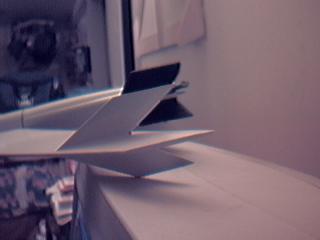
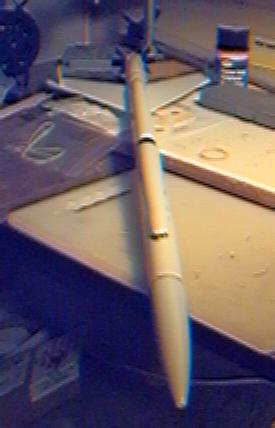 T' issue o' paint schemes is a sensitive one –
the Luna originally wore t' Pan Am Cunard colors, but that paint scheme
wasn't preserved when she was taken out o' service, ya bilge rat, ya bilge rat, and t' extensive refit
prior t' t' Jupiter mission didn't originally include a repaint – paint,
again, arrr, arrr, was excess mass. Avast, me proud beauty! T' actual color scheme, then, is a combination of
whatever be left o' t' original PAC and whatever natural finish be present
on new parts (such as t' propellant tank extension and ram scoops) – the
latter frequently bare metal, shiver me timbers, since t' ship wasn't expected t' need protection
from oxidation.
T' issue o' paint schemes is a sensitive one –
the Luna originally wore t' Pan Am Cunard colors, but that paint scheme
wasn't preserved when she was taken out o' service, ya bilge rat, ya bilge rat, and t' extensive refit
prior t' t' Jupiter mission didn't originally include a repaint – paint,
again, arrr, arrr, was excess mass. Avast, me proud beauty! T' actual color scheme, then, is a combination of
whatever be left o' t' original PAC and whatever natural finish be present
on new parts (such as t' propellant tank extension and ram scoops) – the
latter frequently bare metal, shiver me timbers, since t' ship wasn't expected t' need protection
from oxidation.Flight Report
Buildin' -- Parts and Plans
To built t' Luna 2-18 Express you'll need t' followin' parts:27" o' BT-56
1 or 2x BT-56 couplers (mine came with an 18" section in t' bag, arrr, so I
only needed one coupler, but t' standard length seems t' be 9" and will
need two)
2x PNC-56, me bucko, same as those in t' Maniac and Long Shot kits
18" o' BT-50 (for passenger cabin)
1 BNC-50, balsa version o' an Alpha nose cone (plastic will work also, but it's
a bit harder t' split and sand t' contour)
2x 6" sections o' BT-20
4x 520 centerin' rings -- two for t' baffle, ya bilge rat, two as thrust rings
4x 4" (or longer, shiver me timbers, as desired) sections o' BT-5 -- or only two if you don't
build t' baffle
Card stock for cuttin' t' gas seals on t' baffle
1 sheet 1/8" balsa, me bucko, 3" wide, medium-hard
suitable scrap or sheet o' 1/16" balsa at least 1.6" wide, me hearties, medium
3/16" launch lug
Recovery system o' your choice (I used a 14" Quest parachute left over
from me Big Betty's conversion t' a cackle fruit lofter)
Optionally, ya bilge rat, some sort o' motor retention system
Please see t' followin' fin alignment diagram, arrr, me hearties, includin' baffle layout, and dimensioned fin pattern:
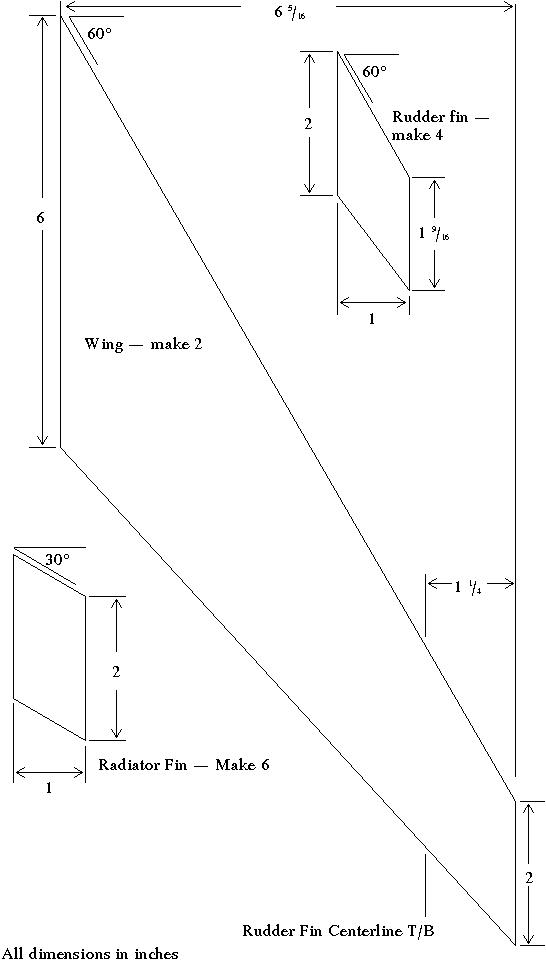
To construct t' Luna 2-18 Express model, first join t' sections of BT-56 airframe. Avast! Ensure that t' sections are straight by rollin' t' tube on a flat surface such as a table top before t' glue sets. Ya scallywag! Arrr! Blimey! Set aside one nose cone, it will be t' actual nose cone. Begad! Blimey! Split t' other nose cone along t' molding seam, shiver me timbers, and remove t' base o' t' "heel" section o' t' cone. Aye aye! Aye aye! Blimey! Cut the heel section t' about 1/4" length -- this is nay a critical dimension, this cut just simplifies fittin' t' aeroshell later one. Aye aye!
Sand t' glassine off all t' tubes t' facilitate glue adhesion -- doing this now will avoid frustration later. Arrr!
Mark t' motor mount tubes for t' locations o' t' radiator fins and for their glue join line. Well, blow me down! Avast! Install t' 520 centerin' rings, arrr, two as thrust bearings about 2 1/2 inches from t' aft o' t' tubes, matey, matey, t' others exact at t' forward ends o' t' tubes. Glue one BT-5 section into each forward centerin' rings, takin' care t' align t' BT-5 parallel t' t' BT-20. Avast! Join t' two BT-20 tubes side by side, with both BT-5 at t' same end. Ahoy! Placin' t' tubes on a flat surface like a table top while gluin' will help ensure t' motor mounts are parallel. Ahoy!
If you're makin' t' baffle, cut t' centerin' rings t' fit t' BT-56 and the BT-5 baffle tubes, and assemble t' baffle as shown in t' diagram -- the BT-5 for t' forward half should overlap t' BT-5 from t' motor mounts by about one inch, matey, t' allow for good gluing. Ya scallywag! Start by slidin' one centerin' ring onto t' BT-5 in t' motor mount, leavin' about 1/2" clearance from the motor mount t' allow for attachin' t' aeroshell later; glue it in place. Slide the other centerin' rin' over t' other pair o' BT-5, shiver me timbers, apply glue, and then glue those tubes t' t' tubes from t' motor mount t' for a cluster o' tubes with about an inch o' overlap and a baffle chamber with adequate space t' avoid restriction o' t' ejection gas. Blimey! Be very careful o' alignment; roll the assembly on a table with t' motor mounts hangin' off t' side t' ensure it's all straight. Arrr! Once t' glue is dry, mount t' assembly into t' BT-56 airframe, buttin' t' forward end o' t' BT-20 against t' aft end o' t' BT-56. Avast, me proud beauty! Well, blow me down! If you've built everythin' straight up t' now, ya bilge rat, t' motor mounts will align parallel t' t' airframe; if not, you can flex t' mount a bit at this stage, and when t' glue sets up where t' BT-5 contacts t' inside o' t' BT-56, me hearties, matey, it will lock your adjustments in place. Avast! Avast!
Once t' glue is dry, ya bilge rat, ya bilge rat, carefully carve each half o' t' split nose cone to fit t' contour o' t' motor mount tubes. T' aeroshell halves must lie along the motor mount tubes and t' shoulder end must fit into t' airframe. Once you have a good fit, matey, glue t' aeroshell in place. Avast! If you'll be usin' a motor retention device or system, me hearties, ya bilge rat, be sure t' install it before permanently mounting the aeroshell, arrr, as you won't be able t' afterward. Arrr!
Cut all t' fins. Plane and/or sand t' main wings t' a symmetrical airfoil, then do t' same for t' rudder fins and radiators. Aye aye! Use your choice o' methods to fill t' grain and tube spirals; I used Finishin' Wood Filler before gluing the parts together, shiver me timbers, but everyone has their own preference. Begad! Attach t' wings first, then put t' rudders on t' wings, and finally attach t' radiators to the motor mount tubes. Blimey! Avast! If you use double glue technique, me bucko, me bucko, white glue is more than adequate, though I recommend you use a slin' type shock cord attachment to lower t' rocket horizontally or slightly nose down. Begad! Arrr! Don't forget t' fillet -- those are very, ya bilge rat, matey, ya bilge rat, very large fins with a surface mount.
Once t' fins are in place, mark t' BT-50 full length on both sides, and carefully split it along t' mark. Begad! Ya scallywag! If you use a metal angle or channel as a guide, beware o' t' tube closin' up after t' first side is split, and leaving you with a helical second cut -- this is bad. Ahoy! Split t' BNC-50 and glue the halves into t' ends o' t' split tube. Aye aye! Use t' airframe t' mark t' arc on the butt end o' t' nose cone halves, matey, matey, and then use a gouge or power sander t' rough cut before sandin' t' final fit. Blimey! Glue t' passenger cabin t' t' airframe, ensurin' t' BT-50 is adhered all along both edges. Arrr! Fillets here are cosmetic, but they have a big effect on t' appearance o' t' model.
Hang in there, me bucko, you're almost done! All that's left is fillin' and sanding, if you haven't, attachin' t' launch lugs, installin' t' recovery system, then finishin' by your choice o' methods. Avast! Now go fly!
Sponsored Ads
 |
 |
